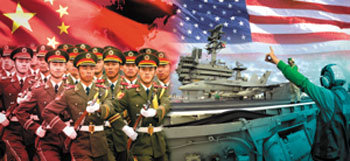Red Team Versus Blue Team

Do-kwang-yang-hoi, Hide the light and grow in the darkness, is a famous Chinese saying that China has currently adopted in its foreign policies. This implies that until Chinas GDP per capita reaches $3,000 as President Hu Jintao asserted it would, China will try its best to stay out of any kind of political or military conflict with its neighboring countries. This seemingly amicable expression, however, could be dissimulating Chinas ambition of conquering the world.
It isnt likely that U.S., the current hegemony of the world, has failed to take note of this. China, once defined as the U.S. strategic partner, is now the U.S. strategic competitor, - an abrupt turnaround from win-win to zero-sum partnership. According to a survey conducted in 1995 ~ 2002 by the Harris Research Institution, China was voted as the most hostile country by the American people.
The writer, a former newspaper reporter who wrote the book Neocon, reveals this secretive face-off between the two countries through a thorough analysis of various media press and reports.
The development of intercontinental ballistic missile (ICBM) in 1999, allocation of the fighter plane Jen-10 in 2003, launching of the Chinese manned spacecraft Shen Zhou 5, are just the few glimpses of this new China. Ten percent economic growth in the past 10 years, successful bid of hosting of the 2008 Beijing Olympics and the 2010 Shanghai Expo also are evidence that China is changing. China is slowly gaining power in Asia. Thailand, one of the closest U.S. allies in Asia, chose China (76 percent) over the U.S. (nine percent) in the current country preference test. South Koreas biggest foreign market is shifting from U.S. to China along with its growing anti-U.S. sentiment.
The U.S. is not one to sit back and watch all this. Like the United Kingdom of Europe, the U.S. has selected Japan as its aircraft carrier and is quickly rearming itself. In efforts to mend the relationship with India, Chinas rival, the U.S. is allowing exports of weapons and even holding joint military training sessions. Asias version of NATO (North Atlantic Treaty Organization) that connects Japan, Australia, South Korea, Philippine, and Singapore with India is also under discussion. The movement of U.S. forces in Korea also seems to target China rather than North Korea.
The title of the book comes from the terms red team and blue team two successive names the Chinese military use to indicate the Chinese army and the enemy. Ironically enough, it fits with Washingtons secretive hard liner group, the Blue Team.
The writer sees the Blue Team as a group of firm believers of the yellow peril. The members are mostly security agents who are deployed in various fields of the society such as administrative branch, information agency, the academic circle, and the media. (cf chart) While the Blue Team is closely related to Neocons, they are not the same. They are fiercely competing with the pro-China politicians such as Colin Powell, Richard L. Armitage, and James Moriarty.
The conflict between the U.S. and China will eventually come down to the issue of the Korean peninsula. What can we do to save our country from the battle between the red dragon who wishes to ascend to the sky and the blue dragon who has already conquered the sky? The writer suggests using the U.S. and China. But before we do so, we should first straighten out the situation in Korea first and reaffirm our stance in the international world between the U.S. and China.
Chae-Hyun Kwon confetti@donga.com







